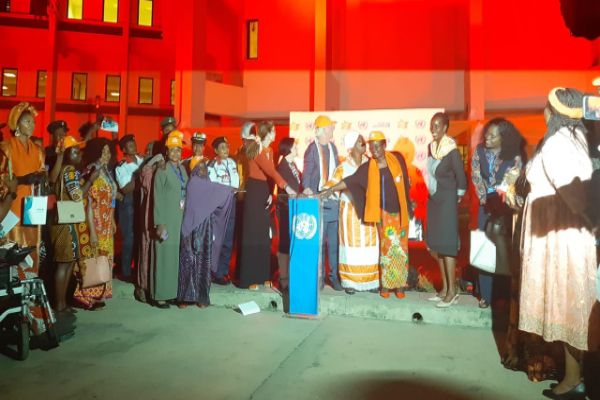By Justina Auta
The UN has called for investments in data collection, evidence gathering and provision of legal support services to ensure speedy access to justice for survivors and victims of Gender Based Violence (GBV) in Nigeria.
Mr Mathias Schmale, UN Resident and Humanitarian Coordinator in Nigeria made the call at the Orange ceremony and Lighting of the UN building in commemoration of the 16 days of activism against GBV in Abuja on Tuesday.
Schmale said the 2022 theme, “Unite Activism to End Violence against Women and Girls” aligns with SDG-17 on global action from all stakeholders to increase awareness and share knowledge to end GBV.
”We need large scale investments in data collection, evidence gathering, and provision of legal support services to ensure access to justice is quick and unhindered. Perpetrators of violence need to be reliably prosecuted.
”We must also pool resources to protect women and girls in humanitarian settings including those affected by the recent catastrophic flooding,” he said.
According to him, the lighting of UN House was to show solidarity with the victims of GBV, while the colour orange signifies UN commitment to a brighter future free from Violence Against Women and Girls (VAWG).
He also stressed the need to increase women participation in politics and ensure their protection against all forms of violence and discrimination in the upcoming 2023 elections.
Ms Beatrice Eyong, UN Women Representative to Nigeria and ECOWAS, said support in designing, implementing strategies and result-oriented programmes towards ending GBV should be year-round.
” We must sustain the momentum for a brighter future where men and women, girls and boys enjoy equal rights, devoid of discrimination and all forms of violence,” she said.
Also, Ms Ulla Mueller, Resident Representative of United Nations Population Fund (UNFPA), regretted that cases of GBV and other harmful practices against women and girls in Nigeria seem not to recline.
Mueller described GBV as a violation of human rights, which slows down progress in every form, calling for more collaboration and commitment to end the menace in Nigeria.
EU Ambassador to Nigeria, Ms Samuela Isopi said the Five years EU-UN Spotlight initiative in Nigeria generated critical results like the domestication of the Violence Against Persons Prohibition VAPP Act (VAPP), establishment of a forensic lab in Adamawa state.
On her part, Mrs Pauline Tallen, Minister of Women Affairs, said despite the declaration of a “state of emergency” on SGBV, rape and other form of GBV still persists.
Tallen, represented by Mrs Funke Oladipo, Director, Women Development Department, said most survivors were denied justice, rapists avoiding prosecution, and cases of rape were unreported due to pervasive corruption, stigma and victim blaming.
” Nigerian authorities and security organisations need to act now to protect women and girls from rampant sexual abuse and violence.
“All reported cases of rape must be thoroughly, promptly, and impartially investigated,” she said.
She therefore stressed the need to strengthen protection mechanisms to prevent and eliminate violence, harassment, threats, intimidation and discrimination against women human rights defenders and women’s rights advocates/activists in line with international standards.
Other highlights were the gallery walk “What Was She Wearing?” exhibition, official orange lighting of the UN building, short video documentaries on ending Violence Against Women and Girls (VAWG).


